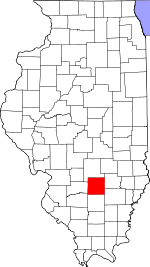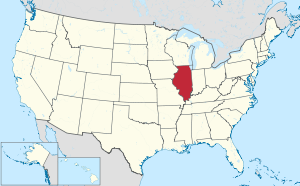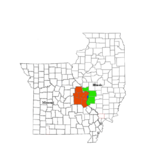Marion County, Illinois
Marion County | |
|---|---|
 | |
 Location within the U.S. state of Illinois | |
 Illinois's location within the U.S. | |
| Coordinates: 38°39′N 88°55′W / 38.65°N 88.92°W | |
| Country | |
| State | |
| Founded | 1823 |
| Named for | Francis Marion |
| Seat | Salem |
| Largest city | Centralia |
| Area | |
• Total | 576 sq mi (1,490 km2) |
| • Land | 572 sq mi (1,480 km2) |
| • Water | 3.7 sq mi (10 km2) 0.6% |
| Population (2020) | |
• Total | 37,729 |
• Estimate (2023) | 36,673 |
| • Density | 66/sq mi (25/km2) |
| Time zone | UTC−6 (Central) |
| • Summer (DST) | UTC−5 (CDT) |
| Congressional district | 15th |
Marion County is a county located in the U.S. state of Illinois. According to the 2020 census, it had a population of 37,729.[1] Its county seat is Salem.[2] Marion County comprises the Centralia, IL Micropolitan Statistical Area, which is included in the St. Louis-St. Charles-Farmington, MO-IL Combined Statistical Area.
History
[edit]Marion County was organized on January 24, 1823, from portions of Jefferson and Fayette counties. It was named in honor of Revolutionary War Gen. Francis Marion, the "Swamp Fox".[3]
- Marion County at the time of its creation in 1823
Geography
[edit]According to the U.S. Census Bureau, the county has a total area of 576 square miles (1,490 km2), of which 572 square miles (1,480 km2) is land and 3.7 square miles (9.6 km2) (0.6%) is water.[4]
The southwest corner of Marion County is the intersection of the Baseline with the Third Principal Meridian, the point of origin for the third survey of the Northwest Territory under the Land Ordinance of 1785. The origin is marked with a boulder south of Centralia just off U.S. 51.
Climate and weather
[edit]| Salem, Illinois | ||||||||||||||||||||||||||||||||||||||||||||||||||||||||||||
|---|---|---|---|---|---|---|---|---|---|---|---|---|---|---|---|---|---|---|---|---|---|---|---|---|---|---|---|---|---|---|---|---|---|---|---|---|---|---|---|---|---|---|---|---|---|---|---|---|---|---|---|---|---|---|---|---|---|---|---|---|
| Climate chart (explanation) | ||||||||||||||||||||||||||||||||||||||||||||||||||||||||||||
| ||||||||||||||||||||||||||||||||||||||||||||||||||||||||||||
| ||||||||||||||||||||||||||||||||||||||||||||||||||||||||||||
In recent years, average temperatures in the county seat of Salem have ranged from a low of 18 °F (−8 °C) in January to a high of 88 °F (31 °C) in July, although a record low of −23 °F (−31 °C) was recorded in January 1994 and a record high of 105 °F (41 °C) was recorded in August 1983. Average monthly precipitation ranged from 2.46 inches (62 mm) in January to 4.37 inches (111 mm) in May.[5]
Transit
[edit]Major highways
[edit]Adjacent counties
[edit]- Fayette County - north
- Clay County - east
- Wayne County - southeast
- Jefferson County - south
- Washington County - southwest
- Clinton County - west
Demographics
[edit]| Census | Pop. | Note | %± |
|---|---|---|---|
| 1830 | 2,125 | — | |
| 1840 | 4,742 | 123.2% | |
| 1850 | 6,720 | 41.7% | |
| 1860 | 12,739 | 89.6% | |
| 1870 | 20,622 | 61.9% | |
| 1880 | 23,686 | 14.9% | |
| 1890 | 24,341 | 2.8% | |
| 1900 | 30,446 | 25.1% | |
| 1910 | 35,094 | 15.3% | |
| 1920 | 37,497 | 6.8% | |
| 1930 | 35,635 | −5.0% | |
| 1940 | 47,989 | 34.7% | |
| 1950 | 41,700 | −13.1% | |
| 1960 | 39,349 | −5.6% | |
| 1970 | 38,986 | −0.9% | |
| 1980 | 43,523 | 11.6% | |
| 1990 | 41,561 | −4.5% | |
| 2000 | 41,691 | 0.3% | |
| 2010 | 39,437 | −5.4% | |
| 2020 | 37,729 | −4.3% | |
| 2023 (est.) | 36,673 | [6] | −2.8% |
| U.S. Decennial Census[7] 1790-1960[8] 1900-1990[9] 1990-2000[10] 2010[11] | |||
As of the 2010 United States census, there were 39,437 people, 16,148 households, and 10,746 families residing in the county.[12] The population density was 68.9 inhabitants per square mile (26.6/km2). There were 18,296 housing units at an average density of 32.0 per square mile (12.4/km2).[4] The racial makeup of the county was 93.1% white, 3.9% black or African American, 0.6% Asian, 0.3% American Indian, 0.4% from other races, and 1.6% from two or more races. Those of Hispanic or Latino origin made up 1.4% of the population.[12] In terms of ancestry, 27.5% were German, 15.8% were Irish, 13.6% were English, and 10.8% were American.[13]
Of the 16,148 households, 30.9% had children under the age of 18 living with them, 48.9% were married couples living together, 12.8% had a female householder with no husband present, 33.5% were non-families, and 28.8% of all households were made up of individuals. The average household size was 2.40 and the average family size was 2.91. The median age was 41.4 years.[12]
The median income for a household in the county was $38,974 and the median income for a family was $50,518. Males had a median income of $41,428 versus $28,042 for females. The per capita income for the county was $20,493. About 12.2% of families and 16.5% of the population were below the poverty line, including 23.9% of those under age 18 and 9.6% of those age 65 or over.[14]
Communities
[edit]Cities
[edit]Villages
[edit]Townships
[edit]Marion County is divided into seventeen townships:
Unincorporated Communities
[edit]Politics
[edit]Initially a strongly Democratic anti-Yankee county, Marion County has undergone two transitions. Between 1912 and 2004 it was a perfect bellwether apart from the Catholicism-influenced 1960 election when substantial anti-Catholic voting by its largely southern white population caused it to support Republican Richard Nixon. Since the beginning of the twenty-first century it has voted consistently for Republican presidential candidates.
| Year | Republican | Democratic | Third party(ies) | |||
|---|---|---|---|---|---|---|
| No. | % | No. | % | No. | % | |
| 2024 | 12,409 | 73.85% | 4,116 | 24.50% | 278 | 1.65% |
| 2020 | 12,678 | 72.47% | 4,524 | 25.86% | 292 | 1.67% |
| 2016 | 11,859 | 69.36% | 4,369 | 25.55% | 870 | 5.09% |
| 2012 | 9,248 | 58.46% | 6,225 | 39.35% | 347 | 2.19% |
| 2008 | 8,691 | 49.92% | 8,345 | 47.93% | 374 | 2.15% |
| 2004 | 9,413 | 54.65% | 7,694 | 44.67% | 117 | 0.68% |
| 2000 | 8,240 | 49.45% | 8,068 | 48.42% | 355 | 2.13% |
| 1996 | 5,999 | 38.06% | 7,792 | 49.43% | 1,972 | 12.51% |
| 1992 | 5,764 | 30.52% | 9,669 | 51.20% | 3,450 | 18.27% |
| 1988 | 8,695 | 50.05% | 8,592 | 49.46% | 86 | 0.50% |
| 1984 | 11,300 | 59.65% | 7,599 | 40.11% | 46 | 0.24% |
| 1980 | 10,969 | 58.73% | 6,990 | 37.42% | 719 | 3.85% |
| 1976 | 8,729 | 46.63% | 9,834 | 52.53% | 157 | 0.84% |
| 1972 | 10,755 | 60.58% | 6,968 | 39.25% | 31 | 0.17% |
| 1968 | 8,134 | 46.09% | 7,737 | 43.84% | 1,778 | 10.07% |
| 1964 | 7,060 | 36.35% | 12,363 | 63.65% | 0 | 0.00% |
| 1960 | 11,121 | 54.92% | 9,116 | 45.02% | 13 | 0.06% |
| 1956 | 10,813 | 55.78% | 8,551 | 44.11% | 21 | 0.11% |
| 1952 | 10,804 | 53.64% | 9,317 | 46.26% | 19 | 0.09% |
| 1948 | 7,798 | 46.19% | 8,878 | 52.58% | 208 | 1.23% |
| 1944 | 9,408 | 47.90% | 10,079 | 51.32% | 153 | 0.78% |
| 1940 | 10,461 | 42.74% | 13,807 | 56.41% | 208 | 0.85% |
| 1936 | 8,321 | 42.79% | 10,820 | 55.64% | 305 | 1.57% |
| 1932 | 6,276 | 36.11% | 10,791 | 62.09% | 313 | 1.80% |
| 1928 | 9,110 | 60.52% | 5,823 | 38.69% | 119 | 0.79% |
| 1924 | 5,889 | 44.01% | 4,768 | 35.63% | 2,724 | 20.36% |
| 1920 | 6,620 | 52.06% | 4,351 | 34.22% | 1,744 | 13.72% |
| 1916 | 6,438 | 42.99% | 7,892 | 52.70% | 646 | 4.31% |
| 1912 | 1,586 | 20.10% | 3,493 | 44.26% | 2,813 | 35.64% |
| 1908 | 3,435 | 43.14% | 4,001 | 50.24% | 527 | 6.62% |
| 1904 | 3,190 | 47.25% | 2,490 | 36.88% | 1,071 | 15.86% |
| 1900 | 3,221 | 43.88% | 3,928 | 53.51% | 191 | 2.60% |
| 1896 | 2,870 | 42.32% | 3,835 | 56.55% | 77 | 1.14% |
| 1892 | 2,324 | 39.88% | 2,709 | 46.49% | 794 | 13.63% |
See also
[edit]References
[edit]- ^ "Marion County, Illinois". United States Census Bureau. Retrieved June 10, 2023.
- ^ "Find a County". National Association of Counties. Archived from the original on May 31, 2011. Retrieved June 7, 2011.
- ^ Gannett, Henry (1905). The Origin of Certain Place Names in the United States. U.S. Government Printing Office. p. 200.
- ^ a b "Population, Housing Units, Area, and Density: 2010 - County". United States Census Bureau. Archived from the original on February 12, 2020. Retrieved July 12, 2015.
- ^ a b "Monthly Averages for Salem, Illinois". The Weather Channel. Archived from the original on October 23, 2012. Retrieved January 27, 2011.
- ^ "Annual Estimates of the Resident Population for Counties: April 1, 2020 to July 1, 2023". United States Census Bureau. Retrieved April 2, 2024.
- ^ "U.S. Decennial Census". United States Census Bureau. Retrieved July 7, 2014.
- ^ "Historical Census Browser". University of Virginia Library. Archived from the original on August 11, 2012. Retrieved July 7, 2014.
- ^ "Population of Counties by Decennial Census: 1900 to 1990". United States Census Bureau. Archived from the original on April 24, 2014. Retrieved July 7, 2014.
- ^ "Census 2000 PHC-T-4. Ranking Tables for Counties: 1990 and 2000" (PDF). United States Census Bureau. Archived (PDF) from the original on December 18, 2014. Retrieved July 7, 2014.
- ^ "State & County QuickFacts". United States Census Bureau. Archived from the original on June 7, 2011. Retrieved July 7, 2014.
- ^ a b c "DP-1 Profile of General Population and Housing Characteristics: 2010 Demographic Profile Data". United States Census Bureau. Archived from the original on February 13, 2020. Retrieved July 12, 2015.
- ^ "DP02 SELECTED SOCIAL CHARACTERISTICS IN THE UNITED STATES – 2006-2010 American Community Survey 5-Year Estimates". United States Census Bureau. Archived from the original on February 13, 2020. Retrieved July 12, 2015.
- ^ "DP03 SELECTED ECONOMIC CHARACTERISTICS – 2006-2010 American Community Survey 5-Year Estimates". United States Census Bureau. Archived from the original on February 13, 2020. Retrieved July 12, 2015.
- ^ Leip, David. "Dave Leip's Atlas of U.S. Presidential Elections". uselectionatlas.org. Archived from the original on March 23, 2018. Retrieved May 1, 2018.


 French
French Deutsch
Deutsch




